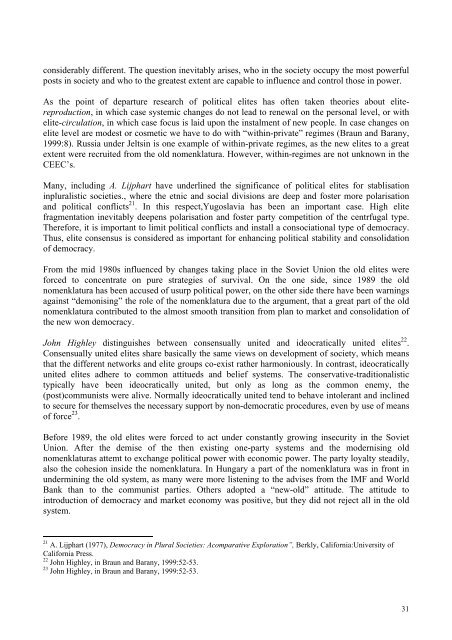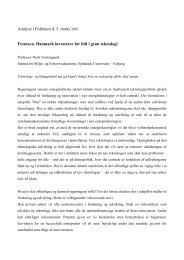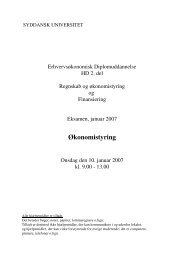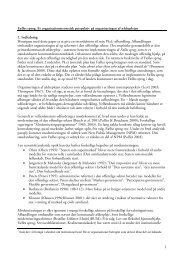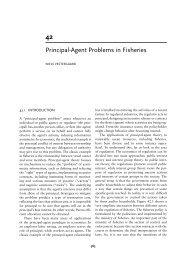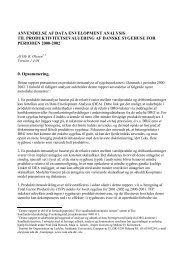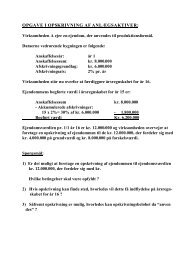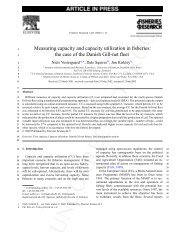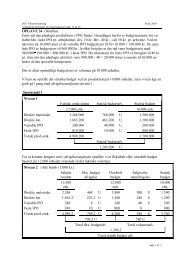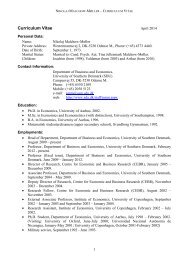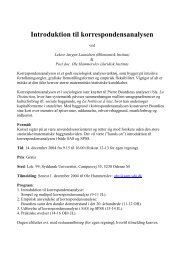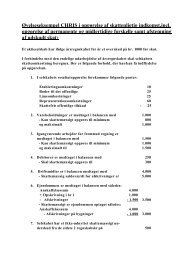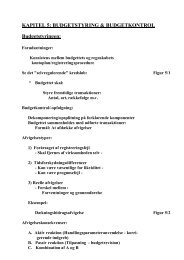Development of Parties and Party Systems in ... - lah@sam.sdu.dk
Development of Parties and Party Systems in ... - lah@sam.sdu.dk
Development of Parties and Party Systems in ... - lah@sam.sdu.dk
- No tags were found...
Create successful ePaper yourself
Turn your PDF publications into a flip-book with our unique Google optimized e-Paper software.
considerably different. The question <strong>in</strong>evitably arises, who <strong>in</strong> the society occupy the most powerfulposts <strong>in</strong> society <strong>and</strong> who to the greatest extent are capable to <strong>in</strong>fluence <strong>and</strong> control those <strong>in</strong> power.As the po<strong>in</strong>t <strong>of</strong> departure research <strong>of</strong> political elites has <strong>of</strong>ten taken theories about elitereproduction,<strong>in</strong> which case systemic changes do not lead to renewal on the personal level, or withelite-circulation, <strong>in</strong> which case focus is laid upon the <strong>in</strong>stalment <strong>of</strong> new people. In case changes onelite level are modest or cosmetic we have to do with “with<strong>in</strong>-private” regimes (Braun <strong>and</strong> Barany,1999:8). Russia under Jelts<strong>in</strong> is one example <strong>of</strong> with<strong>in</strong>-private regimes, as the new elites to a greatextent were recruited from the old nomenklatura. However, with<strong>in</strong>-regimes are not unknown <strong>in</strong> theCEEC’s.Many, <strong>in</strong>clud<strong>in</strong>g A. Lijphart have underl<strong>in</strong>ed the significance <strong>of</strong> political elites for stablisation<strong>in</strong>pluralistic societies., where the etnic <strong>and</strong> social divisions are deep <strong>and</strong> foster more polarisation<strong>and</strong> political conflicts 21 . In this respect,Yugoslavia has been an important case. High elitefragmentation <strong>in</strong>evitably deepens polarisation <strong>and</strong> foster party competition <strong>of</strong> the centrfugal type.Therefore, it is important to limit political conflicts <strong>and</strong> <strong>in</strong>stall a consociational type <strong>of</strong> democracy.Thus, elite consensus is considered as important for enhanc<strong>in</strong>g political stability <strong>and</strong> consolidation<strong>of</strong> democracy.From the mid 1980s <strong>in</strong>fluenced by changes tak<strong>in</strong>g place <strong>in</strong> the Soviet Union the old elites wereforced to concentrate on pure strategies <strong>of</strong> survival. On the one side, s<strong>in</strong>ce 1989 the oldnomenklatura has been accused <strong>of</strong> usurp political power, on the other side there have been warn<strong>in</strong>gsaga<strong>in</strong>st “demonis<strong>in</strong>g” the role <strong>of</strong> the nomenklatura due to the argument, that a great part <strong>of</strong> the oldnomenklatura contributed to the almost smooth transition from plan to market <strong>and</strong> consolidation <strong>of</strong>the new won democracy.John Highley dist<strong>in</strong>guishes between consensually united <strong>and</strong> ideocratically united elites 22 .Consensually united elites share basically the same views on development <strong>of</strong> society, which meansthat the different networks <strong>and</strong> elite groups co-exist rather harmoniously. In contrast, ideocraticallyunited elites adhere to common attitueds <strong>and</strong> belief systems. The conservative-traditionalistictypically have been ideocratically united, but only as long as the common enemy, the(post)communists were alive. Normally ideocratically united tend to behave <strong>in</strong>tolerant <strong>and</strong> <strong>in</strong>cl<strong>in</strong>edto secure for themselves the necessary support by non-democratic procedures, even by use <strong>of</strong> means<strong>of</strong> force 23 .Before 1989, the old elites were forced to act under constantly grow<strong>in</strong>g <strong>in</strong>security <strong>in</strong> the SovietUnion. After the demise <strong>of</strong> the then exist<strong>in</strong>g one-party systems <strong>and</strong> the modernis<strong>in</strong>g oldnomenklaturas attemt to exchange political power with economic power. The party loyalty steadily,also the cohesion <strong>in</strong>side the nomenklatura. In Hungary a part <strong>of</strong> the nomenklatura was <strong>in</strong> front <strong>in</strong>underm<strong>in</strong><strong>in</strong>g the old system, as many were more listen<strong>in</strong>g to the advises from the IMF <strong>and</strong> WorldBank than to the communist parties. Others adopted a “new-old” attitude. The attitude to<strong>in</strong>troduction <strong>of</strong> democracy <strong>and</strong> market economy was positive, but they did not reject all <strong>in</strong> the oldsystem.21 A. Lijphart (1977), Democracy <strong>in</strong> Plural Societies: Acomparative Exploration”, Berkly, California:University <strong>of</strong>California Press.22 John Highley, <strong>in</strong> Braun <strong>and</strong> Barany, 1999:52-53.23 John Highley, <strong>in</strong> Braun <strong>and</strong> Barany, 1999:52-53.31


